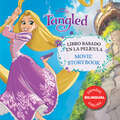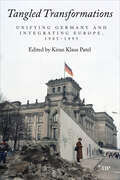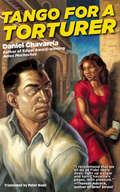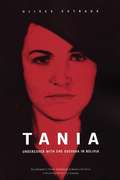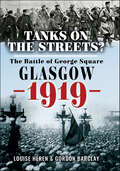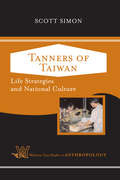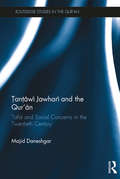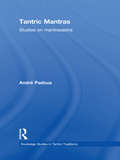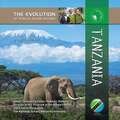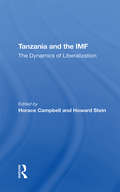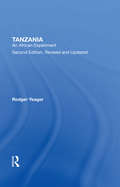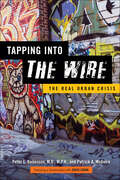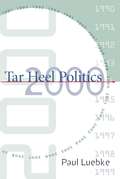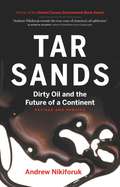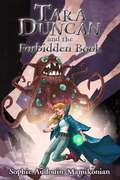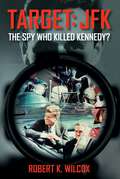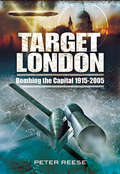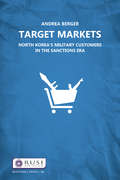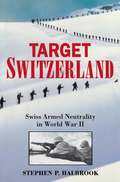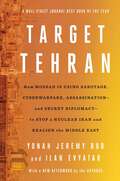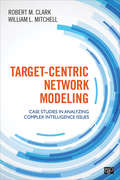- Table View
- List View
Tangled Movie Storybook / Libro basado en la película (English-Spanish)
by Disney Book GroupExperience Disney's Tangled like never before in this English-Spanish bilingual storybook. Únete a Rapunzel al abandonar su torre por primera vez y emprender una aventura mágica que cambiará su vida para siempre. Join Rapunzel as she leaves her tower for the first time and embarks on a magical adventure that will change her life forever.
Tangled Transformations: Unifying Germany and Integrating Europe, 1985–1995 (German and European Studies #54)
by Kiran Klaus PatelTangled Transformations presents a historical analysis of the interplay between German unification and European integration from the mid-1980s to the mid-1990s. Building on freshly released documents, the book’s sixteen chapters explore constellations in which the two processes accelerated and informed one another. The book highlights the role of Germany’s neighbours to the east, with chapters discussing the cotransformation between East and West as well as chapters dedicated to Poland, Romania, and Hungary. It sheds new light on the two interrelated processes by examining the role of Germany’s most important Western neighbours and partners: the United States, the United Kingdom, France, and Italy. The book pays particular attention to the role of the European Commission as well as to monetary and industrial policy. It also moves beyond the economic sphere by discussing foreign and security policy issues, justice and home affairs, German debates about European integration at the time, and the significance of the German federal states. Ultimately, Tangled Transformations demonstrates the strong interlinkages between German unification and European integration.
Tango for a Torturer
by Daniel ChavarríaA former revolutionary plots revenge, in this &“superior crime novel&” from an Edgar Award–winning author &“as adept at comedy as he is at tragedy&” (Publishers Weekly, starred review). Aldo Bianchi, a former Argentine revolutionary now living in Italy, travels to Havana, Cuba. There, he meets the beautiful Bini, a sultry student with great charm and panache working the hotels—and discovers that his nemesis, the Uruguayan military torturer Alberto Ríos, is living in the country as well, under a false identity. Putting his tropical holiday on hold, Bianchi goes on the hunt for his sadistic enemy, in this &“unusual political thriller . . . By turns bawdy, funny, dark, cheerful, learned, and madcap, populated with memorable characters&” from a winner of both an Edgar and a Dashiell Hammett Award (Booklist).
Tania: Undercover with Che Guevara in Bolivia
by Ulises EstradaThe story of the Cuban undercover agent sent to Bolivia in advance of Che's arrival, told by a key participant in the revolutionary movement in Latin America. Ulises Estrada was the principal organizer of Che's guerrilla mission to Bolivia and the man who trained Tania in her position as Cuba's Bolivian spy. Tania, born Haydee Tamara Bunke to German Jewish refugees in Argentina, became one of Cuba's most successful agents, penetrating Bolivia's high society and attaining direct contact with the President. She was killed in the 1967 ambush of Che's guerrilla group.
Tanks on the Streets?: The Battle of George Square, Glasgow, 1919
by Louise Heren Gordon BarclayAt 12.08pm on Friday 31 January 1919, Margaret Buchanan drives her tram into George Square in Glasgow’s city center. She slows down to avoid the youths and men holding their arms up to stop her; some even jump onto the front of her tram. Swirling around her tram is a sea of heavy-coated men who have been on strike since Monday, demanding a reduction to a forty-hour working week. Crucially, the tram workers have not joined the strike; they are being abused as ‘scabs’. Constables and officers of Glasgow’s police force use their hands to try to part the crowd to allow the tram to proceed, but their efforts fail and batons are drawn. Within minutes, the violence will have spread across and beyond the Square; men will have been injured; the Sheriff will have read the Riot Act; strike leaders will lie stunned and bleeding inside the City Chambers; policemen and protestors will lie beaten in the streets. The violence and destruction in the Square, the streets to the north and south, in Glasgow Green and even south of the River Clyde, involves thousands of men. The city authorities believe the situation is beyond the control of the outnumbered police; the Sheriff sends a message to the local army commander requesting assistance. For the first time in history, tanks will be dispatched as ‘military aid to the civil power’. They will be accompanied by 10,000 soldiers. At approximately 12.30pm on Friday 31 January 1919, a century of myth-making commences. Using thousands of pages of court papers, memoirs and news reports, this book is the first attempt to tell the story of what happened in day-by-day detail.
Tanners of Taiwan: Life Strategies and National Culture (Case Studies in Anthropology)
by Scott SimonTanners of Taiwan is an ethnography of identity construction set in the leather-tanning communities of Southern Taiwan. Through life history analysis and ethnographic observation, Simon examines what it means to be Chinese - or alternatively Taiwanese - in contemporary Taiwan. Under forty years of martial law from 1947 to 1987, the Chinese Nationalist Party tried to create a Chinese identity in Taiwan through ideological campaigns that reached deep into families, schools and workplaces. They justified their rule through a development narrative that Chinese culture and good policy contributed to the prosperity of the Taiwan miracle. These ideological claims and cultural identities, however, have never been fully accepted in Southern Taiwan. This ethnography is the first to document from the ground level how those claims have been contested, and how a new Taiwanese identity has been constructed since democratization. Tanners of Taiwan provides more than a description of workplaces in Taiwan. Looking at the different perspectives of tanners, women managers, and workers, it demonstrates how cultural and other identities are constructed through dynamics of power and political economy. A small, affordable case studies book to be assigned with a core textbook in introductory anthropology courses. Shows how the US reader is connected to the seemingly distant lives of Taiwanese tanners. Simon follows hides from the US to tanneries in Taiwan, then elsewhere to be made into shoes and other leather goods, and then back to the consumer in the US - demonstrating concretely the notion of "global interconnectedness." Anchored in personal observation and ethnographic detail, the book makes very tangible such otherwise abstract notions as "national identity" and "global integration."
Tantawi Jawhari and the Qur'an: Tafsir and Social Concerns in the Twentieth Century (Routledge Studies in the Qur'an)
by Majid DaneshgarShaykh Ṭanṭāwī Jawharī was an Egyptian exegete known for having produced a scientific interpretation of the Qurʾān. A pioneering scholar in terms of familiarising the people of his time with many previously neglected matters regarding Islam and science, his publications shocked the Cairo educational system and other Muslim places of learning in the early twentieth century. This book examines the intersection between Ṭanṭāwī Jawharī and Egyptian history and culture, and demonstrates that his approach to science in the Qurʾān was intimately connected to his social concerns. Divided into three parts, part one contains three chapters which each introduce different aspects of Ṭanṭāwī Jawharī himself. The second part explores the main aspects of his tafsīr, discussing his approach to science and the Qurʾān, and how he presented Europeans in his tafsīr, and then addressing the impact of his tafsīr on wider Muslim and non-Muslim society. The third section draws attention to the themes from all 114 sūras of the Qurʾān that are discussed within his commentary. It then analyses the current status of his views and the post-Jawharism perspective on science and the Qurʾān, both today and in an imaginary future, in 2154. Providing new English translations of Ṭanṭāwī Jawharī’s work, the book delivers a comprehensive assessment of this unique figure, and emphasises the distinctive nature of his reading of the Qurʾān. The book will be a valuable resource for anyone studying modern Egypt, the Qurʾān, Islam and Science, and scientific interpretation and inimitability.
Tantric Mantras: Studies on Mantrasastra (Routledge Studies in Tantric Traditions)
by Andre PadouxProviding a systematic and complete overview of the highest scholarly quality on Tantric mantras in Hinduism, this book presents a summary on the nature of Tantric mantras, their phonetic aspect, structure and classifications. Additionally, it explains the metaphysical-theological nature of Tantric mantras and gives an introduction to their beliefs and practices. In individual chapters, Andre Padoux discusses the extraction and examination of mantras, certain characteristics such as their "perfect nature" and their imperfections, and he describes certain mantrics practices. For the first time, Andre Padoux' work on Tantric mantras is made accessible to an English-speaking readership. This book will be of great interest to scholars of Religious Studies, Theology, Indology, South Asian Studies, and Asian Religion.
Tanzania (The Evolution of Africa's Major Nations)
by Joan Vos MacdonaldThe United Republic of Tanzania was created in the 1960s by the merger of two independent countries: Tanganyika, a territory on mainland East Africa, and the Zanzibar islands in the Indian Ocean. Tanzania has been a stable and relatively peaceful democracy, although in recent years religious clashes have touched off disputes over election results. Tanzania has many natural resources, including the rare gemstone tanzanite, but it is one of the poorest countries in the world. This is due in part to a huge public debt the government incurred over the previous three decades. The AIDS epidemic has also weakened the economy by taking growing numbers of people out of the workforce. Since 2000, Tanzania's government has taken positive steps toward lessening poverty, reducing debt, growing the economy, and attempting to slow the spread of AIDS.
Tanzania And The Imf: The Dynamics Of Liberalization
by Howard Stein Joel Samoff Horace CampbellThe recent debate on the consequences of structural adjustment for developing economies, which took place between the World Bank and the United Nation's Economic Commission on Africa, underlines the need for further investigation of this important economic strategy. Tanzania, which for a decade had stood as a symbol of opposition to the Internation
Tanzania The Story of an African Transition
by Roger Nord Yuri Sobolev Niko Hobdari David Dunn Alejandro Hajdenberg Samar Maziad Stéphane RoudetIn 1985, Tanzania was in severe economic distress, plagued by widespread shortages and high inflation. Agricultural production, the mainstay of the economy, had been declining steadily since the 1970s. Exports of cash crops, which traditionally accounted for the bulk of foreign exchange earnings, had fallen by half between 1970 and 1985. A foreign exchange shortage led to a precipitous drop in imports, which in turn caused a crisis in the manufacturing sector, which lacked raw materials and spare parts. Twenty years later, Tanzania looks radically different. Inflation has declined to single digits (Figure 1). Economic growth is buoyant, averaging 7 percent a year since 2000. Real per capita income has risen by 50 percent. Poverty, while still widespread, is heading downward. Exports are booming, public finances are sound, debt ratios are low (Figure 2), and foreign exchange reserves are ample. This paper is about the remarkable turnaround, the economi
Tanzania: An African Experiment
by Rodger YeagerThis book provides an overview of Tanzania, one of Africa's economically most distressed, socially most innovative, and politically most controversial countries. Focusing on the last three decades, it glimpses into the rich Tanzanian past and reflects influences from the world's major cultures.
Tapping into The Wire: The Real Urban Crisis
by Peter L. Beilenson Patrick A. McGuireStory lines from The Wire challenge public perceptions about the deadly, real-world connections between drugs, crime, and poverty.Did Omar Little die of lead poisoning? Would a decriminalization strategy like the one in Hamsterdam end the War on Drugs? What will it take to save neglected kids like Wallace and Dukie? Tapping into 'The Wire' uses the acclaimed television series as a road map for exploring connections between inner-city poverty and drug-related violence. Past Baltimore City health commissioner Peter Beilenson teams up with former Baltimore Sun reporter Patrick A. McGuire to deliver a compelling, highly readable examination of urban policy and public health issues affecting cities across the nation. Each chapter recounts scenes from episodes of the HBO series, placing the characters' challenges into the broader context of public policy.A candid interview with the show’s co-creator David Simon reveals that one of the intentions of the series is to expose gross failures of public institutions, including criminal justice, education, labor, the news media, and city government. Even if readers haven’t seen the series, the book’s detailed summaries of scenes and characters brings them up to speed and engages them in both the story and the issues. With a firm grasp on the hard truths of real-world problems, Tapping into 'The Wire' helps undo misconceptions and encourage a dialogue of understanding.
Tar Heel Politics 2000
by Paul LuebkeOffering an insightful analysis of North Carolina political trends and personalities, Paul Luebke moves beyond the usual labels of Republican and Democrat, conservative and liberal. In Tar Heel Politics 2000, he argues that North Carolina's real political battle is between two factions of the state's political and economic elite: modernizers and traditionalists. Modernizers draw their strength from the bankers, developers, news media, and other urban interests that support growth, he says. Traditionalists, in contrast, are rooted in small-town North Carolina and fundamentalist Protestantism, tied to agriculture and low-wage industries and threatened by growth and social change. Both modernizers and traditionalists are linked with politicians who represent their interests. An updated and revised version of Luebke's Tar Heel Politics: Myths and Realities (1990), Tar Heel Politics 2000 highlights the resurgence of the southern Republican Party for the first time in a century and discusses a number of significant changes that have occurred over the last decade. These include the institutionalization of a viable two-party system in the General Assembly, the further shift of native-born whites throughout the South into the Republican voting column, and ideological conflict in North Carolina that parallels to some extent the post-1994 battles between the Republican Congress and the Clinton White House. In addition, the book provides a detailed analysis of the political appeal of Senator Jesse Helms and draws on Luebke's insights as a member of the North Carolina State House since 1991.
Tar Sands
by Andrew NikiforukTar Sands critically examines the frenzied development in the Canadian tar sands and the far-reaching implications for all of North America. Bitumen, the sticky stuff that ancients used to glue the Tower of Babel together, is the world's most expensive hydrocarbon. This difficult-to-find resource has made Canada the number-one supplier of oil to the United States, and every major oil company now owns a lease in the Alberta tar sands. The region has become a global Deadwood, complete with rapturous engineers, cut-throat cocaine dealers, Muslim extremists, and a huge population of homeless individuals.In this award-winning book, a Canadian bestseller, journalist Andrew Nikiforuk exposes the disastrous environmental, social, and political costs of the tar sands, arguing forcefully for change. This updated edition includes new chapters on the most energy-inefficient tar sands projects (the steam plants), as well as new material on the controversial carbon cemeteries and nuclear proposals to accelerate bitumen production.
Tara Duncan and the Forbidden Book (Tara Duncan Ser.)
by Princess Sophie Audouin-MamikonianOn the planet OtherWorld, Tara’s friend Cal is convicted of a crime he didn’t commit, and she and her friends set out to prove him innocent. It’s an unlikely crew: Tara, the riddle-loving Fabrice, Robin the half-elf, Sparrow the shape-shifting princess, and Tara’s cultured grandfather—and black Lab—Manitou. Blue gnomes help Cal break out of prison, but at a terrible price. To force him to help liberate their people from an evil wizard, they infect Cal with a time-release poison that Tara and her friends must race to neutralize. Helped by Fafnir the dwarf, they defeat the wizard and travel to Demonic Limbo for evidence of Cal’s innocence. There, Tara has a wrenching encounter with the ghost of her dead father.Back on OtherWorld, the situation is grim. Fafnir accidentally releases the terrible Devourer of Souls, who nearly conquers the planet. In desperation, Tara changes into a dragon and allies herself with her nemesis, Magister. They defeat the Devourer, and Tara hurls Magister into Limbo, hopefully forever. Meanwhile, the Empress of Omois has discovered that Tara is her niece and heir. She insists that Tara come live on OtherWorld for good. If Tara refuses, it will mean war. This is the exciting sequel to Tara Duncan and the Spellbinders and is sure to captivate young readers for hours of excitement and adventure!
Tarangire: Human-Wildlife Coexistence in a Fragmented Ecosystem (Ecological Studies #243)
by Christian Kiffner Monica L. Bond Derek E. LeeThis edited volume summarizes multidisciplinary work on wildlife conservation in the Tarangire Ecosystem of northern Tanzania. By drawing together human-centered, wildlife-centered, and interdisciplinary research, this book contributes to furthering our understanding of the often complex mechanisms underlying human-wildlife interactions in dynamic landscapes. By synthesizing the wealth of knowledge generated by anthropologists, ecologists, conservationists, entrepreneurs, geographers, sociologists, and zoologists over the last decades, this book also highlights practicable and locally adapted solutions for shaping human-wildlife interactions towards coexistence. Readers will discover the reciprocal and often unexpected direct and indirect dynamics between people and wildlife. While boundaries (e.g. between people and wildlife, between protected and un-protected areas, and between different groups of people) are a common theme throughout the different chapters, this book stresses the commonalities, links, and synergies between seemingly disparate disciplines, opinions, and conservation approaches. The chapters are divided into clear sections, such as the human dimension, the wildlife dimension and human-wildlife interactions, representing a detailed summary of anthropological, ecological, and interdisciplinary research projects that have been conducted in the Tarangire Ecosystem over the last decades. Beyond, this work contributes to the debate about land-sharing versus land-sparing and provides an in-depth case study for understanding the complexities associated with human-wildlife coexistence in one of the few remaining ecosystems that supports migratory populations of large mammals. The topic of this book is particularly relevant for students, scholars, and practitioners who are interested in reconciling the needs of human populations with those of the environment in general and large mammal populations in particular.
Target JFK: The Spy Who Killed Kennedy?
by Robert K. WilcoxHe was born in Buenos Aires and educated in Geneva and Cuba. He was a daring WWII paratrooper who parachuted behind enemy lines on D-Day. He was a handsome, charming man who briefly worked as a Hollywood stuntman.He was also a spy who may have killed John F. Kennedy.The shocking new book Target JFK reveals page-after-page of incredible, never-before-reported evidence that a mysterious Argentinian with a stranger-than-fiction life story is the missing link in the assassination mystery that has puzzled America for half a century.
Target London: Bombing the Capital, 1915–2005
by Peter ReeseLondon was a target for Zeppelins and bombers during the First World War, for bombers, V1s and rockets in the Second, and for Cold War missiles and for terrorists in more recent times, yet rarely has the history of twentieth-century attacks on the capital been studied as a whole. Peter Reese, in this thought-provoking account, vividly describes how the destructive potential of aerial bombing and terrorist actions has increased and how Londoners have struggled to protect themselves and their city.He looks at the strategic aims of the bombing campaigns panic, devastation, paralysis of communications and the collapse of morale - and contrasts them with the actual responses of Londoners of civilians who faced this new form of indiscriminate warfare. As he traces the developing theory and practice of air power, he dispels myths and misunderstandings that still surround the subject.His narrative follows the story from the commencement of the First World War when the development of aircraft accelerated and the possibilities of aerial warfare came to be appreciated and feared. There are graphic accounts of the German raids on the city in the First World War, of the intense interwar debate about the impact of bombing, and of the ordeal that followed - the Blitz and the V1 and V2 campaigns.He also considers in the concluding chapters more recent threats to the capital which come, not from aircraft and missiles, but from the bombing tactics adopted by terrorists, and the need for appropriate responses.
Target Markets: North Korea’s Military Customers (Whitehall Papers)
by Andrea BergerA UN arms embargo has been in place against North Korea for nearly a decade, as part of a broader sanctions regime designed to deny it the goods and funds needed to fuel its nuclear weapons and ballistic-missile programmes. Yet despite these sanctions, a host of state and non-state actors continue to buy arms, material and services from Pyongyang – and inject funds into the same coffers that drive North Korea’s nuclear and missile development. While some of North Korea’s military customers in the sanctions era since 2006 are well known – such as Iran, Syria and Burma – Pyongyang’s wider client base receives little international attention. North Korea has continued to enjoy access to other defence markets across Africa and the Middle East. The drivers of these clients’ decisions to buy weapons and related goods from North Korea are rarely discussed. This gap in analysis is essential to fill. If tailored and effective approaches are to be developed to convince North Korea’s customers to buy elsewhere, they must be based on a sound understanding of the considerations that motivated the client to turn to Pyongyang in the first place. Target Markets comprehensively analyses the available information on these procurement decisions. It concludes, contrary to conventional wisdom, that the reasons that customers buy weapons and related goods and services from North Korea vary, often greatly. This study also concludes that one of the greatest achievements of the UN sanctions regime to date has been to deny North Korea access to modern conventional weapons technology that it can learn to manufacture at home and sell on to its clients around the world. Without more contemporary wares to tempt foreign buyers, North Korea will likely continue to see its client list for weapons and related goods and services shrinking.
Target Switzerland: Swiss Armed Neutrality in World War II
by Stephen P. HalbrookA fascinating and enlightening explanation of the dilemma Switzerland found itself in during the 1930's and 1940's. --Publishers Weekly
Target Tehran: How Israel Is Using Sabotage, Cyberwarfare, Assassination – and Secret Diplomacy – to Stop a Nuclear Iran and Create a New Middle East
by Yonah Jeremy Bob Ilan EvyatarA Wall Street Journal Best Book of the Year/Politics Winner of the Jewish Book Council&’s Natan Notable Book Prize &“One of the most accurate and fascinating books so far&” (Michael Bar-Zohar, coauthor of Mossad) about how Israel used sabotage, assassination, cyberwar—and diplomacy—to thwart Iran&’s development of nuclear weapons and, in the process, begin to reshape the Middle East.Yonah Bob and Ilan Evyatar describe how Israel has used cyberwarfare, targeted assassinations, and sabotage of Iranian facilities to great effect, sometimes in cooperation with the United States. Even as it takes lethal action, Israel has managed to alter the politics of the Middle East, culminating in the Abraham Accords of 2020. Arab states such as Bahrain and the United Arab Emirates normalized relations with Israel, and the holy grail of normalization with Saudi Arabia may yet be achieved. Despite the war with Hamas, these Arab states share Israel&’s concern with Iran, remaining silent while Israel undermines Iran&’s nuclear program. Bob and Evyatar reveal how Israel has used documents stolen from Tehran in a daring, secret Mossad raid to show the United States and the International Atomic Energy Agency how Iran has repeatedly violated the 2015 JCPOA nuclear agreement and lied about its active nuclear weapons program. Drawing from interviews with top confidential Israeli and US sources, including from the Mossad and the CIA, the authors tell the &“thrilling&” (Lt. Gen. H.R. McMaster, author of Battlegrounds) inside story of the tumultuous, and often bloody, history of how Israel has managed to outmaneuver Iran—so far.
Target-Centric Network Modeling: Case Studies in Analyzing Complex Intelligence Issues
by Robert M. Clark William L. MitchellIn Target-Centric Network Modeling: Case Studies in Analyzing Complex Intelligence Issues, authors Robert Clark and William Mitchell take an entirely new approach to teaching intelligence analysis. Unlike any other book on the market, it offers case study scenarios using actual intelligence reporting formats, along with a tested process that facilitates the production of a wide range of analytical products for civilian, military, and hybrid intelligence environments. Readers will learn how to perform the specific actions of problem definition modeling, target network modeling, and collaborative sharing in the process of creating a high-quality, actionable intelligence product. The case studies reflect the complexity of twenty-first century intelligence issues by dealing with multi-layered target networks that cut across political, economic, social, technological, and military issues. Working through these cases, students will learn to manage and evaluate realistic intelligence accounts.
Target-Centric Network Modeling: Case Studies in Analyzing Complex Intelligence Issues
by Robert M. Clark William L. MitchellIn Target-Centric Network Modeling: Case Studies in Analyzing Complex Intelligence Issues, authors Robert Clark and William Mitchell take an entirely new approach to teaching intelligence analysis. Unlike any other book on the market, it offers case study scenarios using actual intelligence reporting formats, along with a tested process that facilitates the production of a wide range of analytical products for civilian, military, and hybrid intelligence environments. Readers will learn how to perform the specific actions of problem definition modeling, target network modeling, and collaborative sharing in the process of creating a high-quality, actionable intelligence product. The case studies reflect the complexity of twenty-first century intelligence issues by dealing with multi-layered target networks that cut across political, economic, social, technological, and military issues. Working through these cases, students will learn to manage and evaluate realistic intelligence accounts.
Target: Alex Cross (Alex Cross #24)
by James PattersonA killer elite--six assassins--are on the loose. So is Alex Cross. A leader has fallen, and Alex Cross joins the procession of mourners from Capitol Hill to the White House. <P><P>Then a sniper's bullet strikes a target in the heart of DC. Alex Cross's wife, Bree Stone, newly elevated chief of DC detectives must solve the case or lose her position. The Secret Service and the FBI deploy as well in the race to find the shooter. <P><P>Alex is tasked by the new President to lead an investigation unprecedented in scale and scope. But is the sniper's strike only the beginning of a larger attack on the nation? <P><b>A New York Times Bestseller</b>
